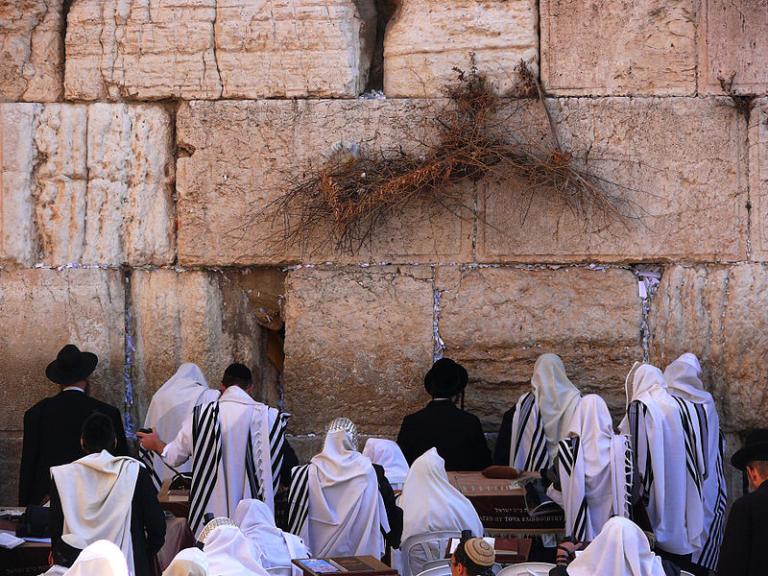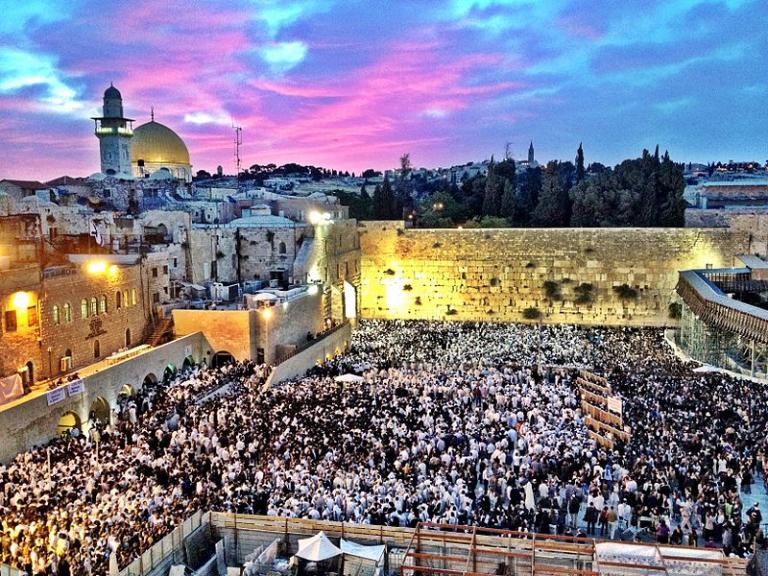
Wikimedia Commons public domain image
First, though, this was posted yesterday on the website of the Interpreter Foundation:
Conference Talks: “Jacob’s Sermon (2 Nephi 6-10) and the Day of Atonement,” by William Hamblin
This talk from 2012 is just a prelude to the 2022 Temple on Mount Zion Conference, coming this Friday and Saturday and featuring C. Wilfred Griggs, Margaret Barker, and many others. Go to https://tmz2022.interpreterfoundation.org for full information, including abstracts and a link to the live broadcast.

Wikimedia Commons public domain image
When I was a young man, Latter-day Saints were far more reflexively and uncritically pro-Israeli than they are today. I think that the change has been for the good.
Shortly after my wife and I were married, we attended somebody else’s wedding reception. As we were going through the line, a man standing there, a relative of the groom (as I recall), asked me what our plans were. I indicated that we would soon be leaving for Egypt, where I was going to be studying Arabic. “Well,” he said in unhesitating response, “I’m on the Lord’s side.”
That naïve and uninformed assumption that the Israelis represent “the Lord’s side,” simpliciter, irked me then and it irks me now. But I encounter it far less commonly than I once did.
Latter-day Saints are scripturally obligated to believe in and to support the gathering of Israel, which plainly includes the gathering of the Jews to Palestine. But we are not obligated, in my view, to support any particular policy of the United States toward Israel, let alone any particular policy of Israel itself.
During my first stint of living in Israel, which occurred just before I came back to the States to marry my wife, I ran into a group of American visitors on the streets in the Sheikh Jarrah section of East Jerusalem (only perhaps tw9 hundred yards or so from where I’m writing at the moment). We got into a conversation, and they told me that they were part of a group who were there to assure then Prime Minister Menachem Begin that all true Christians in America supported him 100%.
I remember that “100%” very clearly.
I don’t support my own government’s policies 100%. I never have. Not even under presidents for whom I’ve voted. And the thought that it is somehow a “true Christian’s” obligation to support any government’s policies fully, completely, and without any dissent or reservation strikes me as, among other things, idolatrous.
Besides which, my feelings about Menachem Begin, of all people, representing the Christian ideal and deserving unlimited Christian loyalty were — shall we say — less than completely enthusiastic.
I won’t for a moment attempt to whitewash the various evils visited upon innocent Jewish people and others by Palestinian terrorism. (There was a fatal incident just today in East Jerusalem, probably within — again — a couple of hundred yards from where we stood yesterday, in a place that I’ve been many times before.) But, unfortunately, Jewish hands are also not entirely clean in the ugliness that has afflicted this land for more than a century now.
And I’m especially bothered when I see some Evangelical Protestants, especially, treat the Arab-Israeli conflict as a battle of obvious good (represented by the righteous Jews who simply want to regain their ancestral land) against obvious evil (the heathen Muslims who seek to steal Jewish land from the Holocaust survivors who have settled upon it and made it to blossom as the rose).
I wish the situation were so simple and clear-cut.
Unfortunately, many of the Jews aren’t pious or even righteous. And, although I don’t concede that Muslims deserve to be oppressed in the first place, many of the Palestinian Arabs aren’t even Muslims. They’re Christians. And they have been for many centuries — Christianity, after all, didn’t begin in Canterbury, Wittenberg, or even Rome, but in Palestine — and their roots in Palestine go back to far before the founding of the State of Israel. Accordingly, they’re mystified when their ostensible Christian brothers and sisters in the West seem to support the alleged “biblical right” of the Jews to take their land.
As a matter of fact, our local guide for this trip here — local guides are legally required — is a Palestinian Arab Christian, a really good fellow whom we’ve known for years.
In 2018, Sahar Qumsiyeh, who teaches mathematics at the Rexburg, Idaho, campus of Brigham Young University, published a book entitled Peace for a Palestinian: One Woman’s Story of Faith Amidst War in the Holy Land. Not long thereafter, two responses to the book appeared in what is now called Interpreter: A Journal of Latter-day Saint Faith and Scripture:
“Dehumanization and Peace,” written by Kent P. Jackson
Abstract: Those who follow world events are painfully aware that peace in the Middle East — and particularly in the Holy Land — seems eternally elusive. From a distance we watch events unfold which we are not able to fully comprehend because of that very distance. There are individuals who are burdened with the devastating reality of living with war and perpetual turmoil in the Holy Land. One of those is Sahar Qumsiyeh, a Palestinian Arab Latter-day Saint who grew up in the West Bank near Bethlehem. Her story of how she converted to Mormonism and learned how to find peace in a troubled world is recommended reading for every Latter-day Saint.
“Peace in the Holy Land,” written by Shirley S. Ricks
Abstract: Living in the Holy Land as a Palestinian Latter-day Saint has created unique challenges and perspective for Sahar Qumsiyeh. In order to attend church meetings in Jerusalem from her home near Bethlehem, Sahar was required to travel under unsafe and stressful circumstances for hours through military checkpoints to cover the few miles’ distance (as the crow flies). Sahar’s story, Peace for a Palestinian, varies dramatically from our own and reminds us that true discipleship requires sacrifice, which in turn brings blessings.
I hope that many Latter-day Saints will read Sahar Qumsiyeh’s book. It will give them a different perspective on a sad historical situation and a painful continuing reality that is a great deal more complex than many Americans realize.
Posted from Jerusalem, Israel












